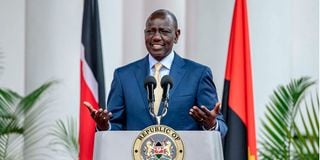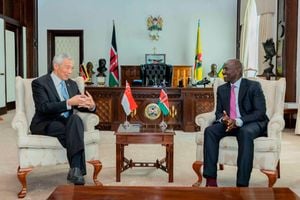
President William Ruto.
Eight Kenyans have sued President William Ruto’s government for “wage slavery”, which they say has been orchestrated by too many taxes and levies introduced “with reckless abandon”.
The petitioners, who approached the High Court under a certificate of urgency, want the court to cap the taxes and levies that can be imposed on an individual at 20 per cent and 30 per cent for corporate bodies.
“In its classical meaning, any person whose labours can only afford them the basic necessities of food, clothing and shelter is considered a slave or a wage slave. Over the last one year, many Kenyans have fallen into the wage slave bracket despite the fact that Article 30 of the Constitution absolutely prohibits slavery in Kenya,” they said in the petition.
Also Read: You’ve no choice, Ruto says on housing levy
“The petitioners contend that excessive taxation is the main reason why wage slavery is becoming institutionalised in Kenya as the incumbent government, supported by its rubber-stamp National Assembly, enacts and enforces new laws to justify deduction of taxes and levies from the income of workers and business owners.”
GRAPHIC | CHRISPUS BARGORETT | NMG
The petitioners have lamented that the government, aided and abetted by the International Monetary Fund and the World Bank, has embarked on a mission to invent and enforce too many taxes to the extent that the majority of Kenyan workers and their families have been impoverished and their human dignity violated by state-induced impunity and socio-economic trauma.
They implored the court that over the past year, “too many taxes and levies have been introduced with such reckless abandon”.
Since July this year, the Kenya Kwanza administration has introduced new tax policies, including an increase in monthly Paye taxes from a maximum of 30 per cent to 35 per cent; a new 1.5 per cent housing tax, with an equivalent amount paid by the employer; a 2.75 per cent hospital insurance fund levy; and a 3 per cent turnover (gross sales) tax on small businesses.
There has also been the doubling of VAT on fuel products to 16 per cent and an increase in corporate tax from 25 per cent to 30 per cent.
Already, the Federation of Kenya Employees (FKE) said last month that a preliminary survey shows that 70,000 Kenyans have lost their jobs in the past year and more are at risk of losing their jobs even as employers consider further job cuts.
The lobby blamed the implementation of the controversial Finance Act, 2023 as the genesis of the current woes, saying that if the current state of affairs continues, 40 per cent of employers will be left with no option but to send their workers home.
“A compelling conclusion must be made that the Kenya Kwanza government is guilty of abuse of the powers to tax and impose levies under Articles 209 and 210 of the Constitution,” the petitioners said.
Kenyans staged protests earlier this year, with politicians holding public rallies over the high cost of living, leading to the formation of the National Dialogue Committee (NADCO).
The committee released its report on November 25.
“Unfortunately, whilst the said report makes specific recommendations on how to address the concerns of the political class, it glosses over the matters of the high cost of living and the unfair tax burdens. This petition partly seeks to address and redress this treasonous omission,” the petitioners said.
They argued that unless the court intervenes by capping the taxes and charges that can be deducted to a maximum of 20 per cent for individual taxpayers and 30 per cent for corporate entities, there is a high likelihood that the private sector will be starved of resources to finance its obligations and commitments.
Meanwhile, the petitioners want the court to issue a conservatory order of injunction restraining the government from inventing, prescribing, imposing or enforcing new taxes, levies or charges, pending the hearing and determination of their petition.
The petitioners are also seeking an order restraining the National Assembly and the Senate from adopting the report of the National Dialogue Committee, unless and until a bill is introduced to address the runaway cost of living.
“Pending the hearing and determination of this petition, this court be pleased to issue a conservatory order of injunction to restrain Parliament from considering, debating or passing The Affordable Housing Bill, 2023,” the petitioners said.

Housing Principal Secretary Charles Hinga.
They also want an order stopping the government, through its agencies, servants and agents, from evicting Kenyans from any occupied land to construct high-rise buildings under the Affordable Housing Scheme.
In particular, they want the government to stop evicting the residents of Juja Farm, Gikumani Farm and any other land in Kiambu County to implement the Affordable Housing Scheme.
They want their case to be heard by a bench of at least five judges.
The petitioners say their case was precipitated by the failure of Parliament and the political class, through the National Dialogue Committee (NADCO), to address, recommend, formulate and implement practical or effective solutions to the ever-rising cost of living, largely fuelled by abuse of the government’s power to tax.
The eight petitioners are Fanya Mambo Kinuthia, Kenneth Njagi Njiru, Peter Koira, Charles Mabiru, Ishmael Muriithi Ngung’ira, Jackline Wanjiru Mwangi, Vincent Lempaa Suyianka, and Mount Kenya Jurists Association.
They have sued Attorney-General Justin Muturi, Treasury Cabinet Secretary Njuguna Ndung’u, the National Assembly, the Senate and the Kenya Revenue Authority.
Those listed as interested parties are the Kenya Kwanza Alliance, the Azimio la Umoja-One Kenya Coalition, the Kenya National Commission on Human Rights, Katiba Institute, the Jubilee Party, the Law Society of Kenya and Busia Senator Okiya Omtatah.
Others are the National Council of Churches of Kenya, the Kenya Conference of Catholic Bishops, the Evangelical Alliance of Kenya, the Supreme Council of Kenya Muslims, the Institute of Certified Public Accountants, the Council of Governors, and the Institute of Economic Affairs.
The petitioners say that while the Kenya Kwanza government was elected on the basis of promises made by its leaders during the election campaign, the reality after some 16 months in office is that it has adopted an imperial and condescending mindset in which the income of citizens and businesses is regarded as the property of the state so long as the rubber-stamp Parliament passes some laws or regulations to justify the expropriation of such private property.
They have argued that the current Parliament has abdicated its mandate and chosen to give the Executive the power to fund an emerging Robin Hood economic system and socialist programmes through unbridled raids on the incomes of its citizens and corporate entities.
They argue that while citizens have a constitutional obligation to pay taxes from their income, the same Constitution prohibits the state from depriving citizens of their entire income in the name of taxes, levies, fees and other contributions.
“Consequently, as a matter of legal logic and necessity, there is a constitutional threshold beyond which deductions from income by way of taxes, levies and charges cease to be legitimate and turn into sovereign robbery akin to a slave society, which is absolutely prohibited by the Constitution,” said the petitioners.
They have also claimed that the Affordable Housing Bill is grossly unconstitutional as it effectively transfers the responsibility of providing housing from the state to the tax-paying citizens to benefit another class of hitherto unknown citizens, in the context of Article 43 of the Constitution.
The petitioners contend that the Kenya Kwanza government has increasingly abdicated its duty to provide public services that enable and facilitate citizens to generate wealth and create jobs.
“It is socially untenable and a perversion of public morality to require citizens who cannot afford food and school fees for their families to contribute to a programme to build high-rise flats to house strangers,” they said.
They said there is no legal framework for the Affordable Housing Scheme and argued that the programme seeks to build high-rise ghettos across Kenya.












